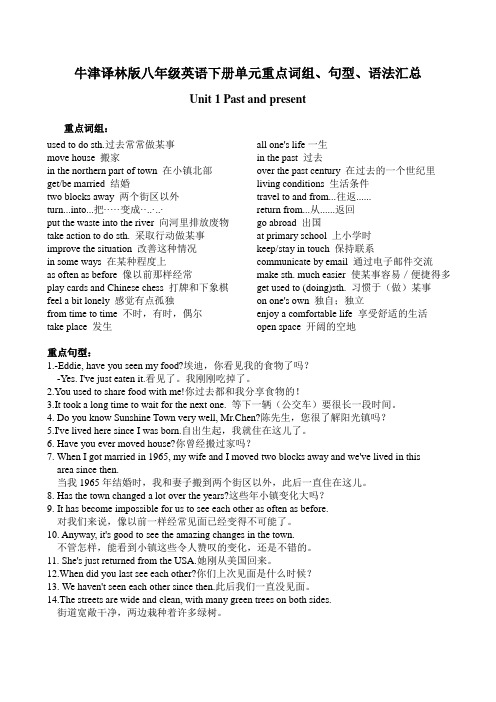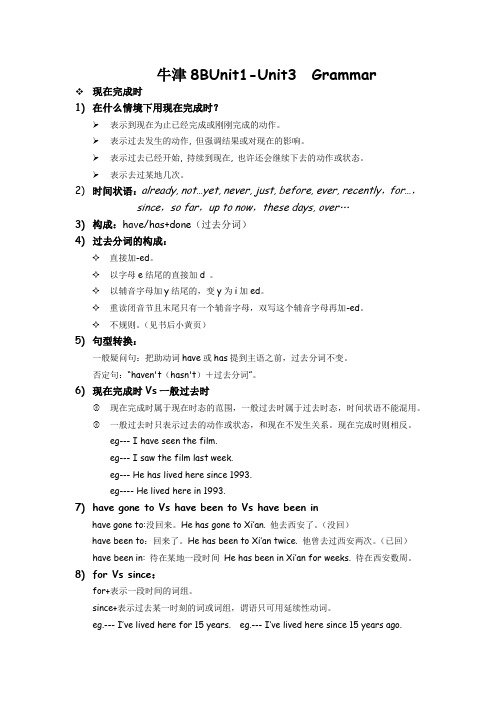英语牛津译林版八年级下册语法大全
2020-2021学年牛津译林版八年级英语下册单元重点词组、句型、语法汇总(Units1-8)

牛津译林版八年级英语下册单元重点词组、句型、语法汇总Unit 1 Past and present重点词组:used to do sth.过去常常做某事move house 搬家in the northern part of town 在小镇北部get/be married 结婚two blocks away 两个街区以外turn...into...把·····变成··..·..·put the waste into the river 向河里排放废物take action to do sth. 采取行动做某事improve the situation 改善这种情况in some ways 在某种程度上as often as before 像以前那样经常play cards and Chinese chess 打牌和下象棋feel a bit lonely 感觉有点孤独from time to time 不时,有时,偶尔take place 发生all one's life一生in the past 过去over the past century 在过去的一个世纪里living conditions 生活条件travel to and from...往返......return from...从......返回go abroad 出国at primary school 上小学时keep/stay in touch 保持联系communicate by email 通过电子邮件交流make sth. much easier 使某事容易/便捷得多get used to (doing)sth. 习惯于(做)某事on one's own 独自;独立enjoy a comfortable life 享受舒适的生活open space 开阔的空地重点句型:1.-Eddie, have you seen my food?埃迪,你看见我的食物了吗?-Yes. I've just eaten it.看见了。
八年级英语下册知识讲义-语法讲解(现在完成时的用法)-牛津译林

知识梳理【教材原句】1. I have just eaten it. 我刚吃过。
2. I’ve lived here since I was born. 我自从出生就住在这儿。
3. My dad has been to Chengdu on business twice. 我爸爸去成都出差过两次。
4. I know you’ve gone to Hainan. 我知道你去海南了。
5. We haven’t seen each other since last week.自从上周我们就没见过面。
【概念】现在完成时表示已经完成的动作,或者表示过去的动作对现在有影响,或一直持续到现在的动作。
构成:have /has + 过去分词否定句:have/has + not+ 过去分词一般疑问句:Have/Has+…+过去分词…?【用法】1. 现在完成时表示已经完成的动作,可以和already, just或yet等连用,表示某动作已经完成、刚完成或还没完成。
already用于肯定句,放在have / has之后或句末,yet用于否定句和疑问句,位于句末或not之后。
【例句】He has already got her help.他已得到她的帮助。
He hasn’t come back yet.他还没有回来。
【考题链接】The man has already finished his work. (改为否定句和一般疑问句)否定句:___________________________________________一般疑问句:_______________________________________答案:The man hasn’t finished his work yet. Has the man finished his work yet?2. 现在完成时可以和ever和never 连用,表示到现在为止动作或状态曾经或从来没有发生过。
牛津译林版八年级下英语知识点总结

Unit1 Past and present1.share... with sb与某人分享/共用......2.by underground/bus/coach乘地铁/乘公共汽车/乘长途汽车by bike/on one’s(或the,a)bike = ride the/a/one’s bike to...骑自行车去...3. be kind to对.....友好4. take a bus坐汽车5. move house搬家6. wait for等候7. be born出生8. all one's life一生9. get married结婚10. since then从那时起11. turn...into....把...变成.....12. improve the situation改善情况13. in some ways在某种程度上,在某些方面by the way顺便说一下lose one’s way迷路in one’s way挡住某人的路on one’s way to在某人去......的路上14. as often as before像以前一样经常15. from time to time不时,有时,偶尔16. feel a bit lonely感到有点儿孤独17. because of +短语because +句子18. hear about听说19. in the past在过去20. most of... ....的大多数21. keep/keep in touch with sb与某人保持联系22. each other互相23. move into...搬进.....24. go abroad出国25. primary school小学26. communicate with sb.与某人交流27. take place发生28. have fun玩得高兴29. run through流经30. play cards打牌31. in the northern part of在...的北部32.on foot步行33. open space开阔的空地34. enjoy a (n)... life享受.....的生活35. on one's own = alone = by oneself单独36. put...into...把.....放进....37. move away搬走38. living conditions居住条件39. a railway station火车站40. in one's free time在某人的空闲时间41.on both sides在两边42. over the years在这几年间43. be used to do sth.被用来做某事used to do sth.过去常常做某事be/get used to doing sth.习惯于做某事44.plan to do sth计划做某事would like /want to do sth想做某事take action to do sth采取行动做某事45.一段时间+ ago ...以前46.much+比较级....得多47.make+宾语+形容词使某人/某物.....48.as+形容词/副词原级+as...和......一样....49.hope + that从句希望....hope to do sth.希望做某事hope sb can/will do sth希望某人做某事50.too many+可数名词复数太多.....too much +不可数名词太多......much to+形容词/副词太.....51.spend... on sth.在某方面花费.....spend..doing sth.做某事花费....52.It+be+形容词+to do sth.做某事是....的。
Unit5单词以及语法点梳理牛津译林版八年级英语下册

dying adj. 奄奄一息的death n. 死亡The hero’s death made us very sad. 这个英雄的死亡让我们很难过。
16. explain v. 解释,说明Can you explain why you were late? 你能解释一下你为什么迟到吗?【拓展】explanation n. 解释,解说,说明She told the court she would give a full explanation of the prosecution’s decision on Monday.她告诉法庭她会在星期一对原告方的决定作出全面解释。
17.against prep. 相反,反对e.g. No one is against this proposal.没有人反对这个提议。
That's against the law,那是违法的。
辨析:against 与for两者都可表示方向,下图指明了两者的区别:for against●→ ←○ ←● ○→向着(赞同)逆着(反对)e.g. The Prince is making for the open sea while the princess is against. 王子号向着大海驶去,而公主号恰好驶回。
18. go off突然作响When the fire alarm went off, we all moved to the playground.消防警铃突然作响,我们都逃到了操场上。
【拓展】★go off变质= go badI didn’t put the food in the fridge in time so it went off. 我没有及时把食物放进冰箱以致它变质了。
★go off爆炸The bomb was exploded under controlled conditions. 炸弹在受控条件下被引爆了。
牛津译林版八年级下册Unit1-Unit3 语法归纳

牛津8BUnit1-Unit3 Grammar❖现在完成时1)在什么情境下用现在完成时?➢表示到现在为止已经完成或刚刚完成的动作。
➢表示过去发生的动作, 但强调结果或对现在的影响。
➢表示过去已经开始, 持续到现在, 也许还会继续下去的动作或状态。
➢表示去过某地几次。
2)时间状语:already, not…yet, never, just, before, ever, recently,for…,since,so far,up to now,these days, over…3)构成:have/has+done(过去分词)4)过去分词的构成:✧直接加-ed。
✧以字母e结尾的直接加d 。
✧以辅音字母加y结尾的,变y为i加ed。
✧重读闭音节且末尾只有一个辅音字母,双写这个辅音字母再加-ed。
✧不规则。
(见书后小黄页)5)句型转换:一般疑问句:把助动词have或has提到主语之前,过去分词不变。
否定句:“haven't(hasn't)+过去分词”。
6)现在完成时Vs一般过去时现在完成时属于现在时态的范围,一般过去时属于过去时态,时间状语不能混用。
一般过去时只表示过去的动作或状态,和现在不发生关系。
现在完成时则相反。
eg--- I have seen the film.eg--- I saw the film last week.eg--- He has lived here since 1993.eg---- He lived here in 1993.7)have gone to Vs have been to Vs have been inhave gone to:没回来。
He has gone to Xi’an. 他去西安了。
(没回)have been to:回来了。
He has been to Xi’an twice. 他曾去过西安两次。
(已回)have been in: 待在某地一段时间He has been in Xi’an for weeks. 待在西安数周。
牛津译林版本初中八年级的英语下册的各单元总结复习学习知识点归纳.docx

8B Unit 1短语和重点句型1.repair over/ more than ten bicycles2.teach us a lot about the history of China3.the changes in Beijing4.during/in/over the past century5. learn more about Beijing’s past and present6. hear about/of⋯hear from sb.= receive/get one ’s letter=receive/get a letter from sb.7.living conditions8.return sth. to sb.9.make communication much easier10.go/travel/study abroad11.at primary school12.keep in touch with each othermunicate with sb.14.take place15.Many changes have taken place in my hometown.29.have their own cars= have cars of their own修理超10 自行教我很多有关中国的史北京的化在去一个多世里北京的去和在了解更多听收到某人来信居住条件把某物某人使交流更方便,使得系更容易去国外在小学互相保持系和某人保持系生(有目的有划的)(happen 偶然生 )我的家生了多化。
8B Unit 2短语和重点句型16.travel to and from the town by bus, taxior train17.green hills all around18.a river runs through the centre of town19.get used to the changes of lifeget/be used to sth./ doing sth. 20.many of Mr Chen’s friends21.on one ’s own = by oneself = alone22.throw rubbishrubbish everywhere23.enjoy a comfortable life24.in some large open spaces25.move into new flats26.in their free time27.travel around the town28. on both sides of the street =on each side ofthe street乘汽,出租或火出小旅游青山一条小河穿中心了生活的化某事 /做某事先生的多朋友独自扔垃圾到是垃圾品味舒适的生活在一些大的开的地方搬新公寓在他余在里在街道两有他自己的汽Comic strip & Welcome to the unit:1.去某地度假go to sp for a holiday在度假be on holiday2.我以前去那。
牛津译林版八年级下册 Unit4 A good read 分课时单词短语句型语法知识梳理
Comic strip & welcome to the unit1.read n. 读物reader n. 读者read v. (read-read-read)a good read 一本好的读物an interesting read 一本有趣的读物some good reads 一些好的读物do some reading 阅读2.Have you decided what to do with these books,Hobo?what to do with these books怎么处理这些书“疑问词十不定式”构成的不定式短语, 在句中作宾语。
3..Give them to me then.那就把它们给我吧. give sb sth.=give sth to sb含give动词构成的词组和短语有: give a talk 做报告; give up放弃; give in 屈服; 让步; “use sth to do sth”是固定搭配,意为“使用.....做......”. 如:give sb some advice 给某人提建议; give back 归还; give out 分发4.have to不得不;只好.如:I have to clean the room before my mother comes home. 我不得不在妈妈回来之前打扫房间。
[辨异]have to和must(1)must多表示主观需要或责任感的驱使,有必要或有义务去做某事,多译为“必须”,而haveto多表客观存在的环境所限,即客观要求(无奈)而为之,多译为“不得不干某事.”如:We must be there on time. (责任感的驱使)我们一定准时到达。
I have to do my homework now.(不得不做)我现在不得不做作业。
(2)must没有时态的变化,而have to有时态的变化。
牛津译林版八年级英语下册现在完成时语法知识讲解
牛津译林版八年级英语下册现在完成时语法知识讲解(一)现在完成时的构成1.现在完成时由“have(has)+过去分词”构成。
has 用于主语是第三人称单数时。
(过去分词的构成P122—123中“动词的基本形式”)①I have just finished my homework. 我刚做完功课②I have lived in Guangzhou for more than three years. 我已经在广州住了三年多了。
③My sister has seen the movie many times. 那部电影我姐姐看过好多次了。
2.现在完成时的否定句和疑问句的构成。
否定句:主语+have /has +not+过去分词+其他.说明:have和has常与not 缩写成haven’t 和hasn’t .①I haven’t seen much of him recently 最近我没怎么见到他。
②He hasn’t been to Japan.他没有去过日本。
一般疑问句:Have /Has +主语+过去分词+其它?肯定回答:Yes.主语+have /has.否定回答:No,主语+have /has not。
③---Have you finished your homework ? 你已经做完家庭作业了吗?--Yes, I have(No, I haven’t ) 是的。
(不,还没有)④---Has he passed the test yet ? 他考试及格了吗----Yes, he has . (No , he hasn’t ) 是的。
(不,没及格)巩固练习:1. The bus hasn’t arrived yet. (改成肯定句) The bus ________ _______ __________.2. I have watched the interesting film recently. (改成一般疑问句)______ you ________ the interesting films recently?3. I have already had my breakfast. (改为否定句)I ________ had my breakfast ______.4. I have already finished doing my homework. (改为一般疑问句)_____ ________ finished doing your homework ________?5. She has already worked out that difficult math problem. (改为否定句)She _________ worked out that difficult problem __________.(二)现在完成时的基本用法现在完成时有两个主要用法,“已完成”用法和“未完成”用法。
牛津译林版八年级全册语法知识点总结
8A语法Unit 1 Friends形容词比较级和最高级的变化规则1.规则变化:(1)一般形容词+er +est (shorter, smaller, smallest )(2)以e 结尾的形容词+r +st (nicer, larger, largest)(3)以辅音字母加y 结尾的形容词变y 为i 再+er, est (busier, busiest; heavier, heaviest)(4)以重读闭音节结尾的形容词双写辅音字母+er, est 熟记:大(big)热(hot)天,一个穿红(red)衣浑身湿(wet)透的伤感(sad)胖(fat)子想要变得又瘦(thin)又苗条(slim)2.不规则变化(1)good(well)-better-best(2) many(much)-more-most(3)ill(bad, badly)-worse-worst(4) far-farther (further)-farthest (furthest)(5) little-less-least(6) few-fewer-fewest3.多音节的形容词比较级和最高级在词前加more , mostdelicious-more delicious-the most delicious popular-more popular-the most popular注意: 1 形容词的最高级前必须有the, 而副词的最高级前the 可省略2.比较级前常用a bit, a little, much, a lot, even, far 等词表示程度.3.形容词比较级用来比较两者(人或事)句中常有than; 形容词最高级用来比较三者或三者以上(人或事), 句中常有in 或of 短语表示比较范围.4. as+adj.+as (和------一样------) / not as/so +adj.+ as (不如------,不及------)Unit 2 School life一、比较事物的数量1.many (修饰可数名词)/much (修饰不可数名词)----more ----mostmore + 可数名词复数/ 不可数名词+ than ……比……数量多e.g. I have more friends than you.2.few (修饰可数名词) ----fewer----fewestlittle (修饰不可数名词)----less----leastfewer +可数名词复数+ than ……比……数量少e.g. There are fewer boys than girls in our class.less + 不可数名词+than ……比……数量少e.g. I spend less money on food than my sister.3.the fewest +可数名词复数在……中最少He has the fewest books.4.the least +不可数名词在……中最少She has the least money of us.5.the most + 可数名词复数/ 不可数名词最多Daniel has the most money.二、副词的比较级和最高级(构成方法及用法与形容词基本相同)1.一般在词尾直接加er或est,例如,hard-harder-hardest fast-faster-fastest loud-louder-loudest2、部分双音节词和多音节词分别在原级前加more构成比较级和most构成最高级,例如:slowly-more slowly-most slowly clearly-more clearly-most clearlycarefully-more carefully-most carefully3、副词比较级和最高级的不规则变化well-better-best badly-worse-worstfar-farther/further-farthest/furthestUnit 3 A day out一、as…as的用法表示A与B在某一方面程度相同或不同时用形容词/副词原级。
牛津译林版八年级英语下册Unit1知识点归纳及提高练习
牛津译林版八年级英语下册Unit1知识点归纳及提高练习Unit1 Past and presentWelcome语法知识点1.paste3.timeWelcome巩固习题单项选择1.The building is a cinema now. It a supermakert.A.was ued to beB. used to beC. is used to beingD. uses to be2.There a big river in front of the house,but now it has turned into farmlands.ed to haveB. used to beC. is used to havingD. is used to be3.In some countries,people use computers to the traffic going in a better way.A.helpB. keepC. makeD. let词汇运用1.I don’t think anybody can tell those (different) between the two pictures.2.People live quite different lives at different (time).Reading语法知识点1.interview2.since3.move4.marry5.over6.turn注意:pollute—pullution[不可数名词] improve—improvement[不可数名词] 7.waste8.realize9.alone和lonelyReading巩固习题单词拼写1.They have lived in the small village (自从)1996.2.I want to (提高) my English. Can you help me?3.Collecting (废弃物)is a good way to protect our environment.4.After he went to Canda, I (意识到)how much I missed him.5.When did your parents get (marry) ?6.I want to visit the (south) part of the city when I have time.7.There is much (pollute) in the river. We can’t see one fish.8.Lots of (废品)were produced in this factory in the past.9.Many changes have taken place (在...期间)the years.10.We should work hard at the serious water (pollute).Welcome-Reading词组1.过去常和我分享食物______________________________used to share food with me2.过去对我如此之友好______________________________used to be so kind to me3.不同时代的交通工具______________________________transport at different times4.乘公交车环绕城市________________________________take a bus to go around the city5.乘大巴去其他城市________________________________go to other cities by coach6.花很长时间等下一辆车____________________________take a long time to wait for the next car7.非常了解阳光镇__________________________________know Sunshine Town very well8.自从我出生以来__________________________________since I was born9.搬家____________________________________________move house10.住在镇的北部____________________________________live in the northern part of town11.结婚____________________________________________get married12.搬到两个街区以外________________________________move two blocks away13.自那以来________________________________________since then14.这些年来________________________________________over these years15.把部分镇中心变成新公园_____________________ turn part of the town center into a new park16.水污染问题______________________________________the problem of water pollution17.阳光河边的一家钢铁厂_____________________________a steel factory near the Sunshine River18.把废弃物排放到河里______________________________put the waste into the river19.意识到这个严重问题______________________________realize the serious problem20.采取行动改善形势________________________________take action to improve the situation21.在某种程度上来说________________________________in some ways22.一个美丽的现代化城镇____________________________a beautiful modern town23.像以前一样经常见到彼此__________________________see each other as often as before24.过去常常一起打牌下象棋____________________ used to play card and Chinese chess together25.时不时地感到孤独________________________________feel lonely from time to time26.有丈夫或妻子____________________________________have a husband or wife (pl. wives)27.搬离他的父母____________________________________move away from his parents28.这个镇发生了惊人的变化。
- 1、下载文档前请自行甄别文档内容的完整性,平台不提供额外的编辑、内容补充、找答案等附加服务。
- 2、"仅部分预览"的文档,不可在线预览部分如存在完整性等问题,可反馈申请退款(可完整预览的文档不适用该条件!)。
- 3、如文档侵犯您的权益,请联系客服反馈,我们会尽快为您处理(人工客服工作时间:9:00-18:30)。
英语牛津译林版八年级下册语法大全
-CAL-FENGHAI.-(YICAI)-Company One1 英语牛津译林版八年级下册语法大全 (UNIT1)现在完成时的重点和难点 一、现在完成时的"完成用法"和"未完成用法" 1. 现在完成时的"完成用法" 现在完成时的"完成用法"指的是动作发生在过去某一时刻并已结束,但该动作对现在产生了影响,与现在情况具有因果关系。例如:He has turned off the light.他已把灯关了。 (动作结束于过去,但说明的是现在的情况--灯现在不亮了。) 现在完成时"完成用法"的特点是动作不延续,因此,该时态只能与表示不定的过去时间状语(如:already,yet,before,recently等)、频度时间状语(如:never,ever,once等)、包括现在时刻在内的时间状语(如:this morning / month /year...,today等)连用。 例如: Have you found your pen yet你已找到你的钢笔了吗
2. 现在完成时的"未完成用法" 现在完成时的"未完成用法"指的是动作开始于过去某一时刻,一直延续到现在,或可能还要继续下去。 例如:He has lived here since 1978.自从1978年以来,他一直住在这儿。(动作起始于1978年,一直住到现在,可能还要继续住下去。) I have been in the army for more than 5 years.我在部队已经呆了五年多了。(动作开始于5年前,一直延续至今,有可能还要继续下去。) 此种用法的句中常需一个表示一段时间的状语(由since或for引导),或表示与现在时刻相连的时间状语(如:up to now,so far到目前为止)等。 例如:I have heard nothing from him up to now.到目前为止我没有他的任何消息。 注意:(1)现在完成时的未完成用法只适用于延续性动词,不可用于终止性动词,即瞬间完成或延续时间很短的动词。如:come,go,arrive,leave,join,become,die等。 (2)现在完成时常见两种句型: ①主语+have / has been+for短语 ②It is+一段时间+ since从句 例如:He has been in the League for three years.或It is three years since he joined the League. 他入团已三年了。 3、延续性动词和终止性动词的概念 英语中,动词按其动作发生的方式、动作发生过程的长短,可分为延续性动词和终止性动词。 延续性动词表示能够延续的动作,这种动作可以延续下去或产生持久影响。如:learn, work, stand, lie, know, walk, keep, have, wait, watch, sing, read, sleep, live, stay等。 终止性动词也称非延续性动词、瞬间动词或短暂性动词,表示不能延续的动作,这种动作发生后立即结束。如open, close, finish, begin, come, go, arrive, reach, get to, leave, move, borrow,buy等。 4、延续性动词的用法特征 1.延续性动词可以用于现在完成时,其完成时态可与表示"段时间"的状语连用。表示"段时间"的短语有:for two years, during the past three years, since last year, how long等。如:I have learned English since I came here.自从我来到这儿就学英语了。 2.延续性动词不能与表示短暂时间的"点时间"状语连用。如:It raind at eight yesterday morning.(误) rain为延续性动词,而at eight表示"点时间",前后显然矛盾。如果用延续性动词表示一瞬间的动作,可以借助come, begin, get等终止性动词来表示。上句可改为:It began to rain at eight yesterday morning.(正)又如: - When did you get to know Jack? -Two years ago. - Then you've known each other for more than two years. -That's right. 5、终止性动词的用法特征 1.终止性动词可用来表示某一动作完成,因此可用于现在完成时。如: The train has arrived.火车到了。 Have you joined the computer group 你加入电脑小组了吗
2.终止性动词表示的动作极其短暂,不能持续。因此,不可与表示一段时间的状语连用(只限肯定式)。如: (1)他死了三年了。 误:He has died for three years. 正:He has been dead for three years. 正:He died three years ago. 正:It is three years since he died. 正:Three years has passed since he died. (2)他来这儿五天了。 误:He has come here for five days. 正:He has been here for five days. 正:He came here five days ago. 正:It is five days since he came here. 正:Five days has passed since he came here. (1)、(2)句中的die、come为终止性动词,不能与表示"段时间"的状语连用。那么,应如何正确表达呢?可以采用下面的四种方法: (1)将句中终止性动词转换为相应的延续性动词,如上面两例中的第一种正确表达方式。下面列举几例:leave→be away, borrow→keep, buy→have, begin/start→be on, die→be dead, move to→live in, finish→be over, join→be in/be a member of, open sth.→keep sth. open, fall ill→be ill, get up→be up, catch a cold→have a cold。 (2)将句中表示"段时间"的状语改为表示过去确定时间的状语,如下面两例中的第二种正确表达方式。 (3)用句型"It is+段时间+since..."表达原意,如上面两例中的第三种正确表达方式。 (4)用句型"时间+has passed+since..."表达原意,如上面两例中的第四种正确表达方式。 3.终止性动词可用于现在完成时否定式中,成为可以延续的状态,因而可与表示一段时间的状语连用。如: He hasn't left here since 1986. I haven't heard from my father for two weeks. 4.终止性动词的否定式与until/till连用,构成"not+终止性动词+until/till ..."的句型,意为"直到......才......"。如:You can't leave here until I arrive.直到我到了,你才能离开这里。 I will not go to bed until I finish drawing the picture tonight. 今天晚上直到我画完画,我才上床睡觉。 5.终止性动词可以用于when引导的时间状语从句中,但不可以用于while引导的时间状语从句中。when表示的时间是"点时间"(从句谓语动词用终止性动词),也可以是"段时间"(从句谓语动词用延续性动词)。而while表示的是一个较长的时间或过程,从句谓语动词用延续性动词。如:When we reached London, it was twelve o'clock. (reach为终止性动词) Please look after my daughter while/when we are away. (be away为延续性动词短语) 6.终止性动词完成时不可与how long连用(只限于肯定式)。如: 误:How long have you come here 正:How long have you been here
正:When did you come here? 二、现在完成时与一般过去时的区别 1. 一般过去时表示过去某个时间发生的事、存在的状态或经常发生的动作。说话的侧重点只在于陈述一件过去的事情,不强调对"现在"产生的影响。如: He visited Guilin in 1998.他1998年参观过桂林。(只说明去桂林的时间) 2. 现在完成时表示动作发生在过去,对现在造成了影响或产生了结果。不与确定的过去时间状语连用。如: Jill has bought a new computer.吉尔买了一台新电脑。(着重点是现在有了一台新电脑) 3. 两种时态的区分 (1)一般过去时的谓语动词用过去式,而现在完成时的谓语基本构成是"助动词have /has +过去分词"。如:The film started at 7 o'clock. He has been a teacher for many years. (2)一般过去时通常与表示过去的时间状语连用。如:yesterday, last week, two years ago, just now, in 2002等;而现在完成时则常与just, already, ever, never等副词和these days, this week, since..., for...等表示一段时间的状语连用。 看看以下的几组句子,有什么区别① Have you seen the film(A) Did you see the film(B) [说明] 你看过这部电影吗(A)句强调的是被问者对剧情是否了解;(B)句强调的是看这部电影的动作是否发生过,并不强调是否知道其内容。 ② How has he done it(A) How did he do it(B)
